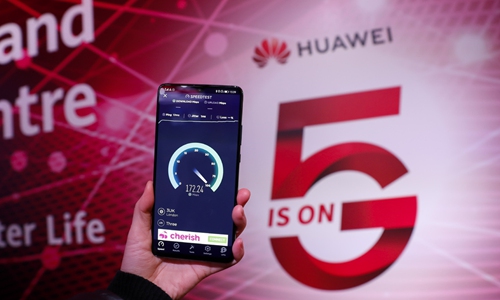
Photo: Xinhua
Affected by the worldwide spread of COVID-19, many countries have closed schools in an effort to contain the coronavirus and begun online classes. Distance learning is not something novel in China, and its access is not hard to get for a vast majority of Chinese students. But it may be a different story in many other countries.The most surprising example could be Germany. It is the largest economy in Europe and leads the world in many spheres but criticized by its own media outlet as the least prepared in Europe for online classes. "That was evident in a recent study of digital learning in the 27 European Union countries by the Center for European Policy Studies: Estonia ranked first, Germany finished last," the Deutsche Welle reported on Thursday. The weak and unstable connection to the internet in many places of Germany was one reason.
Although more than 90 percent of households have internet access in Germany, clearly not all of them have a satisfying experience. This could be one cause for Berlin to carry out a network expansion program, which aims to "transform Germany into a digital paradise by establishing 5G as the standard," according to Germany portal deutschland.de.
Speaking of network expansion, the entire Europe is likely to face a similar problem. The continent has a relatively higher rate of access to the internet, and this has led to a higher cost of expansion. The costs are incurred not only by the technology itself, but by the upgrade of infrastructure.
Such being the case, Chinese high-tech giant Huawei's technology and devices are a pretty cost-effective choice for Europe: In addition to its leading position in 5G technology, the Chinese company has cheaper and good quality equipment endorsed by various US and European operators.
Huawei can be said to be a choice that perfectly meets the needs of Europe. The Chinese company would be a strong support for Europe to upgrade its network and accelerate the development into the digital age. But the US, an ally of Europe, has been obstructing Europe's pick of Huawei over so-called national security threats. The US seems to be very concerned about its allies, but it is worried that its strategy of comprehensively suppressing China will be affected.
The US wishes to use a maximum pressure campaign to crack down on Chinese private enterprises, and thus damage China's high-tech development. However, in contrast to the US urging European countries to abandon the use of Huawei devices, the US has once again delayed its full ban on the Chinese company to May 15. The two-faced move shows the US government's selfishness - it can sacrifice allies' interests without hesitation so as to achieve its own goal of containing China.
The German interior minister suggested in January that his country cannot build a 5G mobile network without China's Huawei, according to an Associate Press report. He implied that Huawei is an indispensable option for Germany or other European countries.
Given the tensions between the US and Europe as well as what Washington has done to Europe while the latter suffers from the COVID-19 outbreak, European countries should think carefully about what the US' real intention is to urge their abandonment of Huawei.
